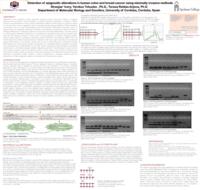- Collection:
- Enhancing Global Research and Education in STEM at Spelman College (G-STEM)
- Title:
- Detection of epigenetic alterations in human colon and breast cancer using minimally invasive methods, 2014
- Creator:
- Ivory, Stranjae'
Tokunbo, Yerokun
Roldan-Arjona, Teresa - Date of Original:
- 2014
- Subject:
- Science
Technology--Study and teaching - Location:
- United States, 39.76, -98.5
United States, Georgia, Fulton County, Atlanta, 33.749, -84.38798 - Medium:
- abstracts (summaries)
- Type:
- Text
- Format:
- application/pdf
- Description:
- Epigenetics is the regulation of gene expression caused by factors other than change in nucleotide sequence. One sub factor is DNA methylation. In particular, abnormal methylation of cytosine in DNA is common in the development of many cancers. Methylation (addition of methyl group) of cytosine at carbon 5 of the pyrimidine ring is an epigenetic mark for transcriptional gene silencing. Majority of DNA methylation in mammals occurs in 5'CpG-3' dinucleotides or CpG-rich stretches of DNA within the promoter region. To deeply analyze how epigenetic alterations contribute to tumorigenesis, this particular research focused on identifying differences in methylation patterns of human colon and breast DNA samples. The initial aim was to retrieve specific methylation profiles from un-methylated and methylated breast and colon samples when used with the necessary primers for further study of cancer diagnoses. To analyze methylation profiles, sodium bisulfite treatment, quantitative methylation specific Polymerase Chain Reaction (qMSP PCR), and Gel Electrophoresis methods were performed. A beta-Actin primer was used to normalize the quantity and quality of DNA present in the samples. Results from the use of a beta-Actin primer confirmed successful DNA isolation from human plasma samples. Amplification of un-methylated DNA was detected at a greater rate of specificity than methylated DNA or tumor cells. Certain methylated samples exhibited un-methylated specificity and un-methylated samples exhibited methylated specificity. There developed a greater concern for the quality of plasma used for isolation of DNA and/or utilization of the Nested PCR technique to better specificity of methylation profiles. Therefore, a better understanding of methylation patterns and/or its frequencies can help in diagnosis, detection, and treatment of these particular cancers.
- External Identifiers:
- Metadata URL:
- http://hdl.handle.net/20.500.12322/sc.gstem:2014_ivory_stranjae
- Language:
- eng
- Extent:
- 1 page
- Original Collection:
- Enhancing Global Research and Education in STEM at Spelman College (G-STEM)
- Holding Institution:
- Spelman College
- Rights:
-
